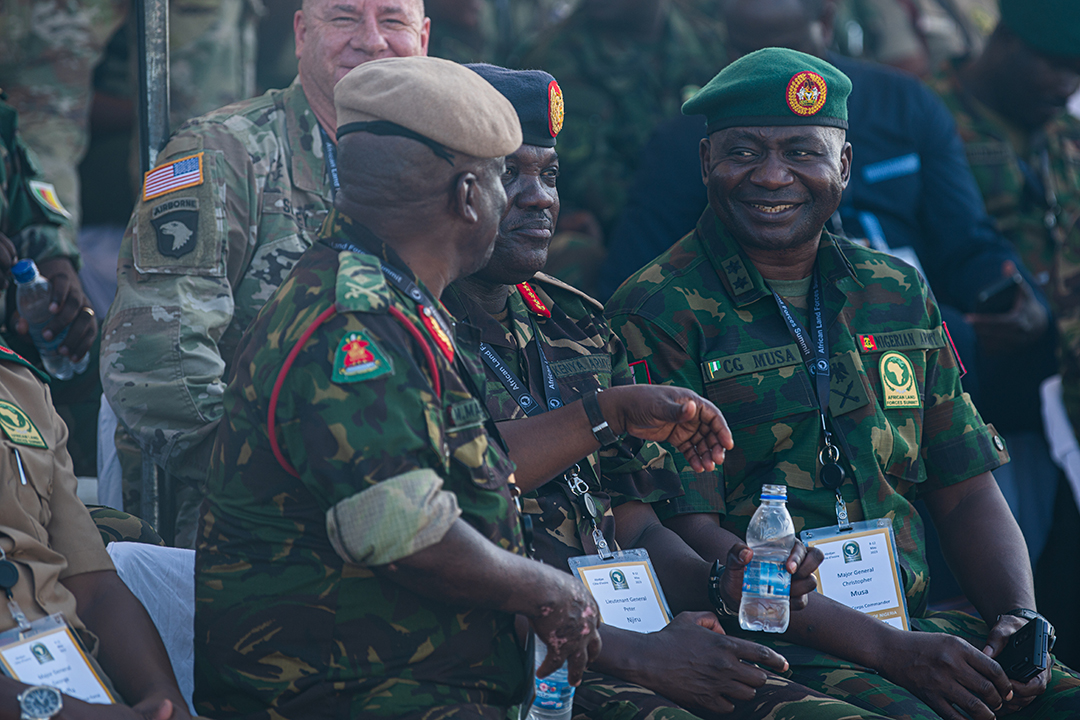Senior Military Leaders Share Expertise at ALFS 23
ADF STAFF
Senior leaders from land forces across Africa gathered in Côte d’Ivoire in May for the 2023 African Land Forces Summit (ALFS). It was an opportunity to discuss the shared threats they face and the need for cooperation as extremist groups seek to push from the Sahel toward the coast of West Africa.
“The land forces need to come together and work together,” said Maj. Gen. Christopher Musa, Infantry Corps commander of the Nigerian Army. “Asymmetric warfare requires the services of everybody––a whole domain approach, all-regional approach. That’s why it’s important for us to meet, look at all the challenges we are facing and the best way to go through it.”
Military chiefs and other leaders from 39 African countries attended the U.S. Army-sponsored five-day summit, along with representatives from organizations such as the African Union and the United Nations.
During the week, they participated in five sessions with presentations by academic thought leaders and panel discussions with government officials. Attendees stressed that the free exchange of ideas and the frank discussion between army leaders is both rare and badly needed.

General Dennis Sitali Alibuzwi, ground forces commander of the Zambian Army, said military leaders often feel constrained and unable to “speak freely” with their counterparts on the continent, but he believed by the end of the summit they would see the benefit of such candid exchanges.
“African armies have got different doctrines, background and history and, therefore, amalgamating all this experience, I’m sure solutions will be found to the African challenges that we face,” said Alibuzwi.
The large and small group discussions covered topics such as peacekeeping operations in Africa, countering violent extremist organizations, drivers of instability and stability, as well as the importance of command teams.
Côte d’Ivoire Chief of Staff of the Grand Chancellery Dr. Jean-Jacques Konadjé described the continent and specifically the Sahel region as the frontlines of counterterrorism policies and approaches. He listed economic, geographic and governmental vulnerabilities that violent extremist organizations seek to exploit and attack.
“Access is not fair and equal when it comes to the distribution of natural resources, and all this is contributing to food insecurity” he said. “We have the Liptako-Gourma region between Niger, Burkina Faso and Mali, a very big no-man’s land.
“We have the availability of weapons moving illegally throughout the region. The borders are also weak and porous.”
With its proximity to the epicenter of terrorism just to the north in the Sahel, the host country presented a backdrop on the vulnerable Gulf of Guinea, which has been targeted by multiple extremist groups.

Lassina Diarra, a researcher at the Centre for Strategies and Security for the Sahel Sahara, gave a presentation on the intent of terror groups to expand and the counterterrorism efforts that have attempted to block such movement.
“West Africa is the hot area in terms of terrorist attacks, one of the hottest spots in the world,” he said on May 11. “[In Mali and Burkina Faso] they have established autonomous cells to commit terrorist attacks.
“The most important thing for them is to create violence in their territories in order to be able to move to other states like Benin, Togo and Ghana.”
He contrasted the subregional efforts of the G5 Sahel group with the Accra Initiative, which have “two different operational and military objectives.”
Lt. Col. Yves Guito Koffo, deputy chief of Côte d’Ivoire’s Military Intelligence bureau, shed further light on his country’s counterterrorism efforts at the subregional and national levels.
“The Accra Initiative is more about intelligence sharing, but right now they are planning for joint operations,” he said.
“[At the national level] in Côte d’Ivoire, the government has tried to enhance the capacity of intelligence gathering, surveillance and also to learn new methods to detect and prevent radicalization.”
The key to fighting terrorism, Diarra said, is multilevel collaborative efforts.
“Cross-border terrorism calls for cooperation at the level of international, regional, sub-regional and bilateral cooperation,” Diarra said. “But some states have made the choice to go looking for mercenaries to cooperate with instead of cooperating with states in the fight against terrorism.”
Summit participants toured L’Académie Internationale de Lutte Contre le Terrorisme (International Academy for the Fight Against Terrorism) and watched demonstrations of counterterrorism operations by Ivoirian Soldiers.
Côte d’Ivoire Chief of Defense Lt. Gen. Lassina Doumbia expressed great pride in hosting a successful ALFS 23.
“It renews the engagement of our countries always to put our solidarity and initiatives together,” he said. “There is hope for furthering human security.”


Comments are closed.